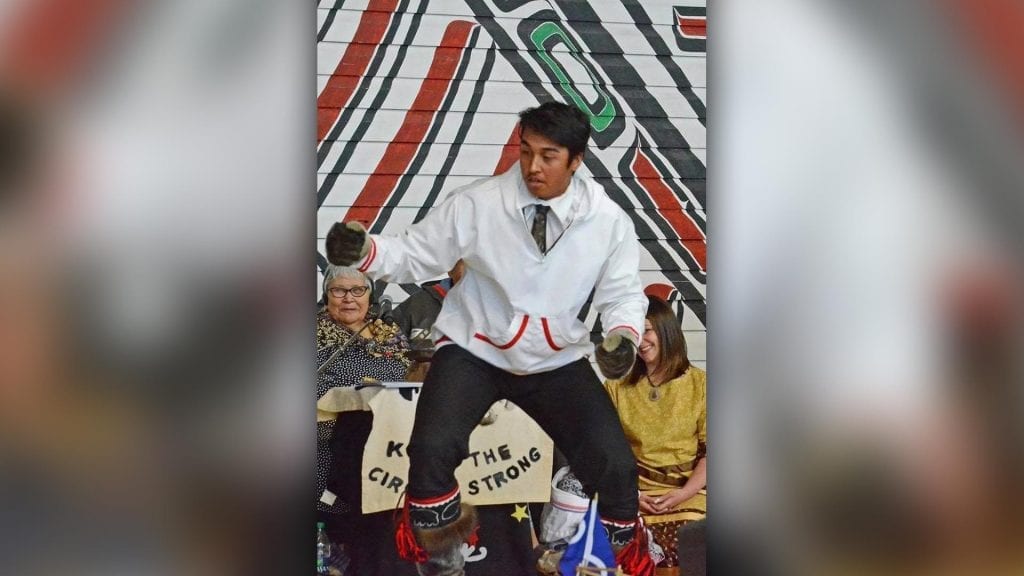
Joe David (J.D.) Nasogaluak, lead plaintiff in the claim, dancing at the MMIWG national inquiry's closing ceremony in 2019. Photo courtesy Diane Nasogaluak
A Federal Court judge has reserved her decision on whether or not to certify a $600-million systemic discrimination class action against the RCMP in the territories following a two-day hearing that wrapped up on Tuesday.
Government lawyers defending the Mounties told Justice Glennys McVeigh that even though top federal officials – including Prime Minister Justin Trudeau and RCMP Commissioner Brenda Lucki – acknowledge the pervasive presence of systemic racism, these comments should be interpreted as a pledge to do better and not legally relevant to the case.
“We say that these statements are not legal admissions, and they do not impact the structure of the plaintiffs’ claim,” said co-counsel Brent Thompson.
“They indicate that what is needed is more progress on policy, and that government must prioritize work to combat racism.”
The class action requires McVeigh’s consent, or certification, to proceed. She reserved her decision after presiding over an MMIWG certification hearing, also against the RCMP, in September 2020.
This claim was filed in 2018 by Joe David (J.D.) Nasogaluak. He says the RCMP assaulted him and called him a “stupid f—cking Native” and “Native punk kid” while out snowmobiling with friends when he was 15.
He’s now 19. As lead plaintiff, he represents all Indigenous people in Nunavut, Northwest Territories and the Yukon who accuse the RCMP of assaulting them or mistreating them because of their race.
Five more complainants have also sworn affidavits accusing Mounties of subjecting them to humiliating and cruel instances of brutality, neglect or racist misconduct.
Catherine Coughlan, co-counsel for the RCMP, said these unproven allegations make the plaintiff’s core claim of harm “entirely theoretical” until individual cases of assault are determined.
She said this would require significant adjudication and investigation in every case, making a group proceeding the less preferred route.
“This case is fundamentally flawed,” said Coughlan. “It’s fundamentally flawed by the inherently individualized nature of the claims that are actually being made.”
Defendant’s counsel noted that the plaintiffs’ altercations with police happened at different times, places and under different circumstances throughout the territories.
They insisted further that allegations of assault and harm are “too nebulous” to define a certifiable class and “overbroad” as criteria.
“There is no viable objective measure to easily ascertain class membership on the basis of an allegation,” said Thompson.
“It draws from too many vast circumstances, too many disparate events.”
Read More:
Certification hearing set to begin for excessive force class action against RCMP in the North
McVeigh heard the plaintiff’s arguments for certification from Koskie Minsky lawyer James Sayce on Monday.
He anticipated these points. He argued a class action “is the only option” in this case.
“This type of litigation simply isn’t possible if it were to be brought by one person, let alone hundreds of thousands of people,” Sayce told the court.
He noted that all group suits brought against the RCMP in the last five years have been certified.
He said the near 3,000 pages of evidence filed by the plaintiff are more than enough to indicate the presence of systemic problems. The filings consist of government documents, news articles, an expert report and sworn affidavits.
“The plaintiff has filed a substantial body of evidence over a long period of time that speaks to systemic evidence, systemic problems, systemic failures and what is well known in the territories as a daily reality of discrimination,” said Sayce.
“There are very serious ramifications of that discrimination.”
The RCMP’s lawyers relied on several other points. They said police use of force is constitutional when exercised within the parametres of the law. They also argued the plaintiff’s lawyers failed to establish existence of a duty of care or fiduciary duty.
“This is not a case where the class-wide duty of care is said to arise from a single incident or act, for example and air crash or train derailment,” said Coughlan.
“The duty alleged arises from different acts in different circumstances and in relation to different individuals.”
She also said “there is no Indigenous interest at play” because the claim is about policing.
“What’s at play, of course, is the role of the police in enforcing peace and the public’s interest in that. There’s no cognizable Indigenous interest in play in a policing context.”
Sayce delivered his hour-long reply on Tuesday afternoon. He referred to the sworn accounts of the complainants, who are all Indigenous, that describe widespread fear and mistrust of the RCMP in the North.
“Canada took it upon themselves to be the police in these territories. They undertook to act in the best interest of the class, the Indigenous putative class members, when it assumed exclusive jurisdiction over policing in the territories,” he said.
Canada’s lawyers insisted there is no “policy of discrimination” at the RCMP – but rather a policy of non-discriminatory and bias-free policing.
Sayce argued that police break this policy in their daily operations. He said it’s fair game for litigation.
“What we’re talking about here isn’t Justin Trudeau sitting down and drafting a policy saying, ‘You must discriminate’,” he added.
“What we’re talking about is a decision, traditions, conduct that’s passed from senior members to junior members that’s systemic across detachments.”









